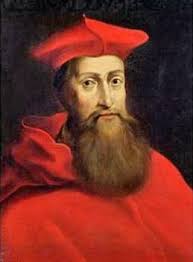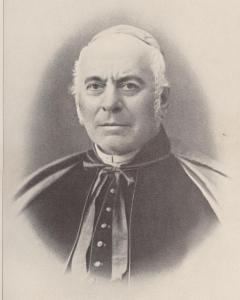The Last Permanent Deacon (before Vatican II)
Just for fun. . .
Most people recognize that the diaconate enjoyed a “golden age” which ended in the 4th Century. The transformation of the diaconate, including the decline of a diaconate permanently exercised began shortly after, although there are the famous exceptions usually given: the English Cardinal Reginald Pole, for example, or Francis of Assisi. However, the last known “permanent” deacon prior to the Second Vatican Council was probably Italian jurist Teodolfo Mertel (1806-1899).
Teodolfo studied in the seminary with the Capuchins, and in 1828, at the age of 22, the brilliant young lawyer received a joint doctorate in both civil and canon law from La Sapienza University in Rome. By the time he was 25 he was serving as a lawyer for the Roman Curia. He served in positions of increasing responsibility between 1831 till 1853, when he was assigned as Minister of the Interior and of Grace and Justice.
Although he received first tonsure in 1843 and the minor orders shortly thereafter, he did not proceed further at that time. At the consistory of 15 March 1858, Mertel was made a Cardinal by Pope Pius IX. On the same day he was appointed President of the Supreme Council for Internal Affairs of the State, and on the next day, 16 May 1858, the pope ordained him a deacon at Castelgandolfo. Cardinal Mertel served in several other major assignments and participated in the First Vatican Council (1869-1870). He continued in various positions, eventually serving as Prefect of the Tribunal of the Signature of Justice from 1877 until his death in 1899. He participated in the conclave of 1878 which elected Pope Leo XIII; he served as Protodeacon of the Mass of Coronation and placed the triple tiara on the pope’s head.
A well-known story from his time observed that, when the Prefect wished to go to Mass, he had to take one of his priest-staff members along to say the Mass.
In his later years, due to illness, he returned to his hometown, where he died 11 July 1899, at the age of 93.
Most people recognize that the diaconate enjoyed a “golden age” which ended in the 4th Century. The transformation of the diaconate, including the decline of a diaconate permanently exercised began shortly after, although there are the famous exceptions usually given: the English Cardinal Reginald Pole, for example, or Francis of Assisi. However, the last known “permanent” deacon prior to the Second Vatican Council was probably Italian jurist Teodolfo Mertel (1806-1899).
Teodolfo studied in the seminary with the Capuchins, and in 1828, at the age of 22, the brilliant young lawyer received a joint doctorate in both civil and canon law from La Sapienza University in Rome. By the time he was 25 he was serving as a lawyer for the Roman Curia. He served in positions of increasing responsibility between 1831 till 1853, when he was assigned as Minister of the Interior and of Grace and Justice.
Although he received first tonsure in 1843 and the minor orders shortly thereafter, he did not proceed further at that time. At the consistory of 15 March 1858, Mertel was made a Cardinal by Pope Pius IX. On the same day he was appointed President of the Supreme Council for Internal Affairs of the State, and on the next day, 16 May 1858, the pope ordained him a deacon at Castelgandolfo. Cardinal Mertel served in several other major assignments and participated in the First Vatican Council (1869-1870). He continued in various positions, eventually serving as Prefect of the Tribunal of the Signature of Justice from 1877 until his death in 1899. He participated in the conclave of 1878 which elected Pope Leo XIII; he served as Protodeacon of the Mass of Coronation and placed the triple tiara on the pope’s head.
A well-known story from his time observed that, when the Prefect wished to go to Mass, he had to take one of his priest-staff members along to say the Mass.
In his later years, due to illness, he returned to his hometown, where he died 11 July 1899, at the age of 93.
We deacons do not need to be made Cardinals. However, we should always strive to find new and creative ways to serve God and God’s people!


No comments:
Post a Comment